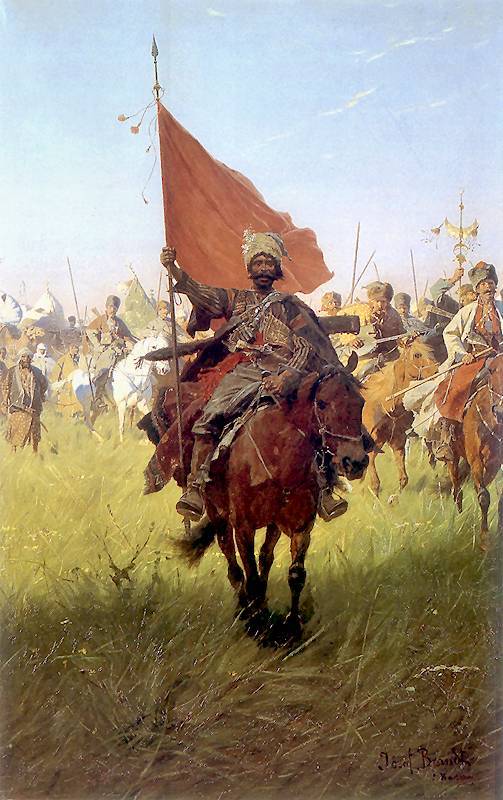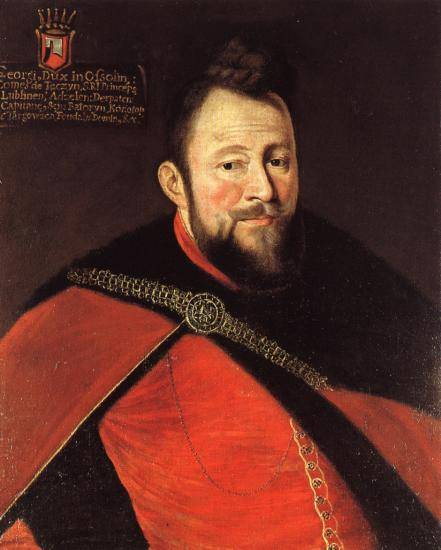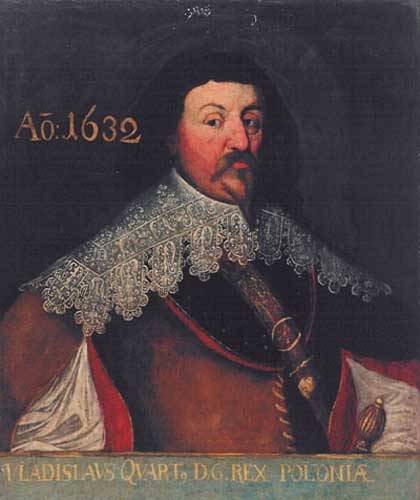How did the Khmelnytsky uprising begin?

Joseph Brand. "Return of the winners (Cossack with a flag)"
General situation
The defeat of the anti-Polish uprisings of Pavlyuk, Ostryanin and Guni in 1637–1638 (The heavy defeat of the Cossacks Ostryanin and Guni in the Battle of Zhovnin and at the Starets) led to a sharp deterioration in the situation not only of ordinary Cossacks and peasants, but also registered Cossacks. The Warsaw Seim in 1638 adopted the "Ordination" on the new regime in Little Russia. The number of registered Cossacks was reduced to 6 thousand people. All others lost the right to be called Cossacks and turned into forced "claps" (draft cattle). Going to the Sich was punishable by death. Hetmans, foremen and other military positions became appointed rather than elected.
Crown troops were stationed in the Russian Ukraine, control was transferred to Polish officials. The Kodak fortress was restored, where 600 people of a good army were stationed. The fortifications were strengthened, a high shaft was poured. At a distance of 3 kilometers from the fortress, a watchtower was set up, from the top of which a large view was opened.
As a result, the “Ordination” of 1638 deprived the registrars of all the rights they had previously received and put them in full subordination to the officials appointed by the Sejm and the Polish government.
On November 24, 1638, the “final commission with the Cossacks” took place in the Maslov Stav tract. In the presence of N. Pototsky and other lords, a decree was announced, which stated, in particular, that the Cossacks "dutifully accept the well-deserved yoke on their necks." The nobleman P. Komarovsky was appointed commissioner of the register, I. Karaimovich and L. Bubnovsky were appointed military captains. Regimental captains and centurions were allowed to be elected by the Cossacks themselves. Among the elected were the Chigirinsky centurion Bogdan Khmelnitsky and Pereyaslavl Fyodor Lyutai.
10 years of "golden peace"
The brutal Polish terror reigned. As the Belgorod governors reported,
The Russian regions belonging to Poland were so sharply cleared and cut out that they calmed down for "10 golden years." But the people did not get better, only worse.
The Polish lords became convinced of their omnipotence and permissiveness, they became more and more impudent. The persecution of the Russian Church intensified. In the west of Little Russia, Orthodox were generally forbidden to join craft workshops, build houses in cities, speak in courts and trade. In official everyday life, the Russian language was supplanted, in all institutions they had to speak and write only in Polish. The last Orthodox magnates in Little Rus', led by Adam Kisel, agreed to submit to Rome and negotiated a new union.
Orthodox churches that stood on the land of the pans (the lands were given to the gentry) were considered the property of the pans. The Poles, mocking the Russians, rented them out to Jewish Jews. They also ascended, felt invulnerable. They offended the national and religious feelings of Russians. They argued and bargained whether to open the church for services and for what amount?
It is worth remembering that at that time the attitude towards churches and faith was different. People were ready to die and kill for their faith. Also, Jewish managers, tenants cleaned up trade, all profitable trades, soldered the population. Nepotism flourished. Where one sat down, his relatives, relatives, and comrades immediately appeared.
As a contemporary wrote:
Belief in the "Good King"
The people lived faith in the "good king" Vladislav IV. He was considered a friend and patron of the Cossacks. During the introduction of the "Ordination", the Cossack ambassadors tried to get help from the king.
But the king could not go against the Sejm and the magnates. The Cossacks need to obey, the king of the ambassadors urged, over time everything can change. The king himself needed help. The gentry did what they wanted, did not obey any royal decrees. The royal treasury was empty, he had nothing to support the army. Vladislav generally became a toy of magnates. The Sejm did not give money.
The dominance of the magnates and their henchmen led to the fact that even the petty gentry were completely defenseless. The nobles could ruin them with courts, smash the possessions with "arrivals" - send a detachment of their servants, often the same gentry, mercenaries, to an objectionable gentry. For example, the great crown hetman Konetspolsky rounded off his possessions with the help of a detachment of mercenaries Lash. He attacked villages and towns. Local residents were robbed, tortured and killed.
According to a contemporary, the wealthy South Russian pan Yerlich, the Lashchevites robbed on behalf of the petty gentry, subjected the gentry's wives and daughters to violence. For such crimes, Lashch was sentenced 236 times to bannitia (exile) and 37 times to infamia (deprivation of honor), but nevertheless, until the death of Koniecpolsky, he avoided punishment. So, mocking the helpless royal court, Lasch appeared at the court of Vladislav IV in clothes trimmed with court sentences condemning him.
The gentry was divided. Many resigned themselves to such lawlessness. They went to serve the big feudal lords. They gave beautiful wives and daughters to the "harems" of nobles. At rich courts, life was fun and satisfying. Others clung to "freedoms", believed that it was necessary to strengthen royal power. The king will ensure the rule of law, support the petty nobles.
Theoretically, there was such a possibility. For example, in France, the kings in the fight against large feudal lords relied on small nobles and cities. Thus a strong royal power and country was created. Vladislav welcomed such sentiments. Under him, a “royal” party was formed as opposed to the “pans”.

Grand Crown Chancellor Jerzy (Yuri) Ossolinsky (1595–1650). Hood. Bartholomew Strobel.
King and Khmelnitsky
Meanwhile, Venice turned to Poland. She offered to join an alliance against the Porte, promised to allocate large sums. The union supported the papacy. The king and chancellor Ossolinsky liked the idea. Poland was freed from tribute to the Crimean Khanate. The gentry received money, awards, booty and land. The king could strengthen the army. Also on the occupied lands to establish large royal fiefdoms.
But the "pansky" party did not need the war. The king could increase his power. The pans stubbornly opposed the project of war with Turkey, defeated all the plans of the king and all the preparations of Ossolinsky.
Then Vladislav and Ossolinsky conceived a cunning maneuver. Use the Cossacks, set them on the Crimea and Turkey. The Sultan will be angry, he will declare war. Poland will have to fight.
In April 1646, military captains Barabash, Karaimovich, regimental captains Nesterenko, Pest, Yatsko and Chigirinsky centurion Bogdan Khmelnitsky secretly arrived in Warsaw. The king took care of them, instructed them to build seagulls-ships, gather a large army and raid Turkish possessions. He issued a royal charter for this - “privilege”. True, in violation of the law, he sealed it not with the state, but with a personal seal. For faithful service, he promised to increase the registry by 2-3 times, withdraw the crown troops from the Russian Ukraine, and return the previous benefits.
Vladislav knew Khmelnitsky for a long time, since the time of the campaign against Moscow in 1618. He was a participant in anti-Polish uprisings, but managed to avoid reprisals and retained a prominent position. Khmelnitsky led detachments of Cossacks who successfully fought for France. The Cossack commander was ready to lead the campaign of the Cossacks against the Turks. It seemed that his dream was coming true - to organize a Cossack army, which could also be used against the pans. When the time came, Bogdan turned to Barabash that it was time to recruit Cossacks and build ships in Zaporozhye. And the registry foreman was in no hurry.
Other Cossack atamans were on their own minds. Barabash and Ilyash chose not a weak king, but a "gentry" party. They laid the plans of Vladislav to the Chigirinsky headman of Konetspolsky. The tycoons sniffed it out through other channels as well. A scandal erupted. At the Diet in November-December 1646, the king was forced to abandon the alliance with Venice, to cancel preparations for war.

King Vladislav IV Vasa (1595–1648). Unknown master, around 1645
Resentment of the Chigirinsky centurion
Khmelnitsky still tried to support the king and realize his plans. I went to visit Barabash, got him drunk and took the letter of privilege. Showing this letter to the Cossacks, he urged them to oppose the Ottomans. Barabash and Ilyash found out about this, got angry, quarreled with Khmelnitsky. Several times they tried to kill Bogdan. But he was lucky, good people helped.
The situation seemed convenient for the Chigirinsky underage Chaplinsky. He laid eyes on the village of Subbotov, which belonged to the centurion, and on his girlfriend. He turned to his boss, the headman of Chigirinsky, Alexander Konetspolsky, the son of the great crown hetman. Bogdan inherited Subbotov, but he had no official papers. Khmelnytsky tried to get the truth in court, he wrote to the king. Vladislav secured the farm for Bogdan, but the royal document did not help either.
Chaplinsky staged a "collision" that was usual for that time. With a detachment of servants, he flew into Saturdays. Bogdan was not at home. Everything was looted and destroyed. The son of Khmelnitsky was flogged and he died. The gentry took away Bogdan's girlfriend and took him as his wife.
Khmelnytsky filed a complaint with Koniecpolsky, but to no avail. Cossack went to court. The court ruled that the farm belongs to the headman, so the headman and the headman are free to dispose of it as they want. Bogdan remembered the "God's judgment" - he challenged Chaplinsky to a duel. But the gentry did not accept the challenge from the "muzhik", sent three mercenaries against him. Bogdan was nearly killed.
Angry Khmelnitsky went to Warsaw. A trial took place. Chaplinsky did not deny that he ordered Khmelnitsky's son to be whipped "for threats." But the boy died not from beatings, but by himself, three days later. Bogdan had no rights to the farm, so there was no robbery. And his wife was unmarried.
Khmelnytsky met with the king, but he waved him off. There were enough problems. He said, if you are a warrior, then deal with things yourself, Polish laws are very loose in this regard. True, Vladislav still hoped for the Cossacks, wrote out a new letter, gave money for boats.
The offended and furious Cossack no longer believed the king, he conceived something else. On the way from Warsaw, he showed privileges and urged people to take on weapon - so far for the king, against the pans. Thus began the Russian people's liberation war.
- Alexander Samsonov
- https://ru.wikipedia.org/
Information